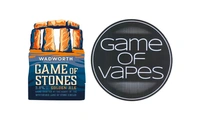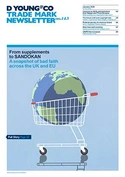UK oppositions: GAME OF THRONES

Home Box Office, Inc (HBO) owns various trade marks associated with its TV show Game of Thrones. The show has been enormously successful in the UK and the USA and is famous for its unexpected plot twists. It is perhaps no surprise, then, that the trade marks have recently been involved in a couple of noteworthy UKIPO opposition decisions.
GAMES OF STONES
Wadworth and Company Limited filed an application for the figurative mark WADWORTH GAME OF STONES (shown above) in connection with “beers; ales; porter; stout; flavoured beers”.
HBO opposed the application on the grounds of a likelihood of confusion, reputation (that the applicant would benefit from the recognition of the earlier marks) and passing off. HBO relied on two earlier EUTMs (a word mark for GAME OF THRONES, covering class 32 goods, including beers; and a Logo for GAME OF THRONES ASCENT in class 41, covering entertainment services related to video games).
The hearing officer considered HBO’s best case to be in connection with its word mark for “beers”. The hearing officer found that the respective marks shared a low level of visual similarity, a high level of aural similarity and a reasonably low level of conceptual similarity.
Whilst HBO licensed its mark for use in connection with beer in the USA, no evidence was submitted showing similar use in the UK. The hearing officer therefore considered that the GAME OF THRONES mark had an average level of distinctive character, and did not benefit from an enhanced distinctive character in connection with beers.
The hearing officer went on to describe the purchasing act of the average consumer, and noted that aural and visual considerations play a part: in some instances, the purchase of beer would be done visually (selection by sight based on pump handles), and in others, it would be aurally requested. The average consumer would be the beer-drinking general public and they would pay a normal level of attention during the purchasing act. Consumers could refer to WADWORTH only (if only one type of WADWORTH-branded beer was available in a pub), but they might also refer to GAME OF STONES (if more than one type of WADWORTH beer was available). The high point of the opponent’s case was considered to be where beer could be purchased aurally in a pub. However, ultimately, it was held that the consumer would not be confused: they would most likely see the pump handle, and the visual and conceptual differences (the stone circle reminiscent of Stonehenge) between the marks would be obvious.
When assessing the reputation claim, the hearing officer held that HBO had provided convincing evidence that it had a strong reputation in connection with its TV series. However, neither of the earlier marks relied upon covered “entertainment services” relating to the TV show. (The logo mark included “entertainment services in the nature of online, video and electronic games” and the evidence did not show reputation for those particular services). The Section 5(3) ground therefore failed.
When considering passing off, the hearing officer held that the applicant’s mark may bring HBO’s sign fleetingly to mind, but it would not lead to a misrepresentation. GAME OF STONES was considered to be “no more than an attempt at parody, namely, an imitation of the style of the opponent’s sign for comic effect, rather than an intent to deceive”. Whilst the application was reminiscent of HBO’s mark (and it was considered likely that inspiration was drawn from the GAME OF THRONES mark), the hearing officer considered the connection to be weak and unlikely to deceive the public into believing there to be a connection between the applicant’s goods and the opponent’s services. As such, there was no misrepresentation and therefore the passing off claim failed.
GAME OF VAPES
Maanmahan Singh (the applicant) filed for GAME OF VAPES figurative mark (shown above) in connection with class 34 “tobacco, smokers articles: matches.”
HBO opposed the application based on an earlier EUTM registration for the word mark GAME OF THRONES covering, inter alia, smoking products in class 34 and travel tour operation services in class 39. Again, HBO claimed a likelihood of confusion, reputation and passing off.
The hearing officer considered the evidence filed by HBO to be sufficient to show that it enjoys a significant reputation and goodwill in connection with its ongoing TV programme under the GAME OF THRONES mark. In the evidence, it was explained that HBO licenses its IP in connection with a wide variety of products.
The respective marks were held to be visually and aurally similar to a medium degree, but there was no overall conceptual similarity, beyond both referring to a “game” of some sort. The earlier trade mark was held to have a higher than average degree of inherent distinctive character, given the mark is meaningless in connection with the goods and services for which it is registered. However, there was no evidence of enhanced distinctiveness beyond the core activity of TV shows.
The hearing officer held that the conceptual differences between the marks were significant and would counteract the visual and phonetic similarities. The average consumer would notice the differences between the marks such that there would be no likelihood of confusion, either direct or indirect. Further, it was noted that the mark applied for is not a natural brand extension of TV shows, and there was no “family of marks” argument raised by HBO. Whilst a consumer might associate the marks, it would not confuse them.
HBO claimed a reputation for goods and services in classes 34, 39 and 43. The hearing officer accepted that there had been use of GAME OF THRONES in connection with some merchandising (including lighters and smoking paraphernalia), but this did not amount to a reputation for those goods. Further, no evidence was put in regarding the relevant markets or market share. Hence the opposition fell down on this ground as the opponent had not shown the relevant reputation.
In relation to passing off, the hearing officer accepted that HBO had goodwill in connection with the TV show and the mark applied for may bring the GAMES OF THRONES mark fleetingly to mind, but was unconvinced that it extended beyond that. In the hearing officer’s view, the applicant’s mark would be seen as a “comedic play” on the GAME OF THRONES mark, and would not amount to a misrepresentation.
HBO submitted evidence that the applicant had previously applied for GAMES OF VAPES in a very similar get-up to the TV show’s marketing. However, the hearing officer stressed that the opposition needed to be assessed based on the current application and not on previous applications. That being said, such evidence might be relevant when looking at the misrepresentation element of a passing off claim.
In short
HBO’s oppositions ultimately failed, despite the hearing officers acknowledging that the applications shared similarities with the earlier marks. Both applications were essentially considered to be parodying the GAME OF THRONES marks.
The decisions are a reminder that having a significant reputation may not, in itself, be enough to succeed. In particular, for reputation claims, the evidence should relate to the goods/services covered by the particular earlier marks being relied upon. Further, for passing off claims, there needs to be misrepresentation: simple imitation of, or a “nod” to, the earlier sign is unlikely to be sufficient.
Case details at a glance (game of stones)
Jurisdiction: England & Wales
Decision level: UKIPO
Parties: Wadworth and Company Limited (applicant) and Home Box Office, Inc (opponent)
Date: 05 February 2019
BL Number: O/072/19
Case details at a glance (game of vapes)
Jurisdiction: England & Wales
Decision level: UKIPO
Parties: Maanmohan Singh (applicant) and Home Box Office, Inc (opponent)
Date: 21 February 2019
BL Number: O/103/19

